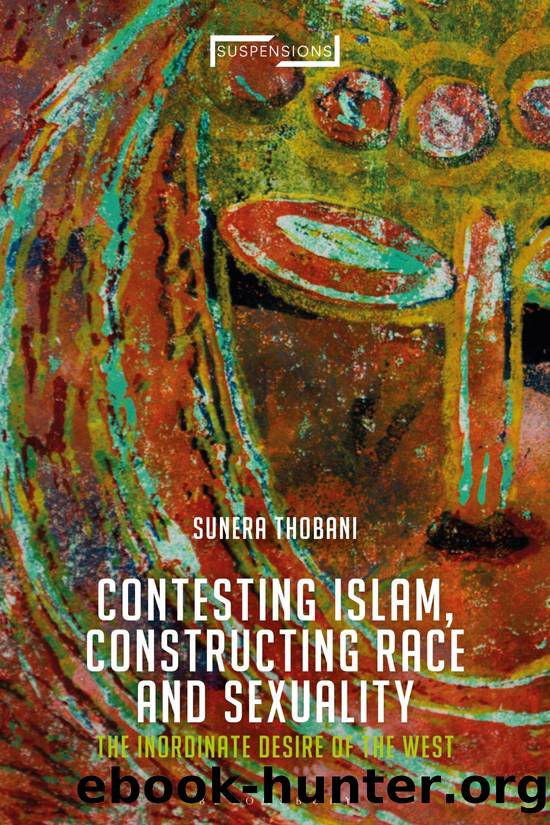Contesting Islam, Constructing Race and Sexuality by Thobani Sunera;

Author:Thobani, Sunera;
Language: eng
Format: epub
Publisher: Bloomsbury Publishing Plc
Chapter 4
Feminism at war
The Abu Ghraib photographs discussed in the previous chapter captured more than the willing participation of US servicewomen in the sexual torture and killing of Iraqi men. This documentary record was met with expressions of shock, horror and grief by some of the most influential feminists in the United States. Even now, as one reads their public reactions, it is difficult to overlook the depth of the sense of betrayal that runs through what became a collective feminist lament:
Even those people we might have thought impervious to shame, like the secretary of defense, admit that the photos of abuse in Iraqâs Abu Ghraib prison turned their stomachs. The photos did something else to me as a feminist: They broke my heart. . . . If you were doing PR for Al Qaeda, you couldnât have staged a better picture to galvanize misogynistic Islamic fundamentalists around the world.1
Why would the murderous violence of the US military and the armies of its allied nation-states be met with the language of âheartbreakâ, âshameâ and âbetrayalâ by feminists? After all, it was the armed forces of the worldâs most powerful state â overseen by a right-wing neoconservative party â that had perpetrated the torture, for it was the Pentagon and the CIA that were allegedly responsible for the violence. Yet for these feminists, âWomen soldierâs participation in the brutal acts of torture stands as the single most shocking revelation to emerge from Abu Ghraib.â2 Might such torture and killing have been rendered less heart-wrenching, understandable perhaps, were it perpetrated only by male US soldiers, intelligence officers, contractors and guards? Why would the instinctive affiliation of feminists â including those on the left, who would presumably be critics of state violence â be with the perpetrators of state violence and not with the brutalized victims, who also included Iraqi women and children? Why the collective pronouncement of shame? Perhaps the use of the occasion by feminists to take yet another swipe at âmisogynistic Islamic fundamentalistsâ to denounce the very Muslims in US custody who were being terrorized provides a clue. It should be recalled that some of these same feminists had earlier rejoiced at the stationing of US servicewomen in Saudi Arabia during the first Gulf War, congratulating the women soldiers for âirkingâ the Saudis by their very presence.3
The substance of the above feminist response to Abu Ghraib, the specific issues on which it was focused and those that it pushed out of view, is instructive.4 The question feminists repeatedly asked was the following: Where had feminism gone wrong? This problem was apparently particularly vexing as many of these feminists had championed the opening up of military service to women, defining this as a major advance in the stateâs recognition of the equal citizenship of women.
The explanations feminists offered to the question of why/where feminism had âgoneâ astray were variations on a number of main themes. The US servicewomen who had participated in the torture must themselves be victims of sexual abuse;
Download
This site does not store any files on its server. We only index and link to content provided by other sites. Please contact the content providers to delete copyright contents if any and email us, we'll remove relevant links or contents immediately.
| Africa | Americas |
| Arctic & Antarctica | Asia |
| Australia & Oceania | Europe |
| Middle East | Russia |
| United States | World |
| Ancient Civilizations | Military |
| Historical Study & Educational Resources |
Machine Learning at Scale with H2O by Gregory Keys | David Whiting(3634)
Never by Ken Follett(3528)
Fairy Tale by Stephen King(2950)
The Man Who Died Twice by Richard Osman(2808)
Oathbringer (The Stormlight Archive, Book 3) by Brandon Sanderson(2633)
Will by Will Smith(2580)
Rationality by Steven Pinker(2149)
The Dark Hours by Michael Connelly(2078)
The Dawn of Everything: A New History of Humanity by David Graeber & David Wengrow(2017)
Can't Hurt Me: Master Your Mind and Defy the Odds - Clean Edition by David Goggins(2004)
Friends, Lovers, and the Big Terrible Thing by Matthew Perry(1994)
Principles for Dealing With the Changing World Order: Why Nations Succeed and Fail by Ray Dalio(1894)
HBR's 10 Must Reads 2022 by Harvard Business Review(1697)
A Short History of War by Jeremy Black(1669)
Go Tell the Bees That I Am Gone by Diana Gabaldon(1600)
515945210 by Unknown(1520)
443319537 by Unknown(1395)
Kingdom of Ash by Maas Sarah J(1389)
A Game of Thrones (The Illustrated Edition) by George R. R. Martin(1368)
